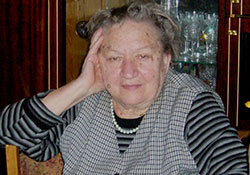Albina Timofeevna Slepneva, 79, Russian Federation

Rostovtseva Natalya
Albina Timofeevna Slepneva is 79 years old. She has spent her whole life in Nizhnij Novgorod, Russian Federation, where she was born, earned a master of science degree at the university, worked and continues to live. After a successful career as head of the local chemical laboratory, Albina is now retired and receives a disability pension.
A widow already for some years, Albina lives alone in a private 2-room apartment in a high-rise apartment block. The building is not centrally located in the city, but it has an elevator and she has her own telephone. She has one daughter who lives with her family in the United States.
Daily life
"What I enjoy most about my age? Freedom: freedom to plan your time as you please (or as your health permits). I have many friends and acquaintances, including some close friends from childhood and university. However, this close circle keeps getting smaller as time goes by. These are all people from my own generation.
"I have friends from other generations who are considerably younger than myself. Some are from my earlier work, some are children of close friends: they are almost part of my family. They help me operate a computer and other modern things, which I find difficult to follow myself.
"Mostly I like to spend time with younger people – for one simple reason: the older generation tends to complain about their health and talk a lot about health issues and their recent medical experiences. I do not like to complain and do not like to listen to stories about other people's diseases. I prefer to be with younger people who do not complain about their health!
"Reading has been a passion since early childhood. Now I mostly re-read books, as I have a big library and enjoy discovering new aspects in the old already-read books. I also have some modern equipment – my daughter bought me an electronic book and downloaded many of my favourite authors. The worst thing that could happen to me is loss of vision, which would lead to the inability to read. My library is mostly old classical books: over the years the font in the old books fades. Electronic books are much better."
Looking back, what advice would you give to younger people?
"It is difficult to give one piece of advice. The most important thing is to find your soul-mate and create a happy and healthy family. When I look back, all my life was full of difficulties and I lived in changing times – World War I, then Stalin's time, then USSR, then the Russian Federation, all kinds of changes. I had a good family, and overcoming all these difficulties made me stronger. The most important and happy day in my life was when I gave birth to my daughter."
Falls prevention
"Because I do not walk well (due to arthritis), I do not go outside very often (about twice a week in summer and even less in winter, when is it icy and slippery). Recently I experienced sudden attacks of dizziness, which once led to a fall at home.
"I am not afraid of falling, as the risk is not big, and I take precautionary measures. At home I stopped making sudden and abrupt movements to prevent the dizziness. Outside I use a cane that has a sharp pin on the bottom, which helps me to move on the slippery ground."
Physical activity
"I used to be active in all kinds of physical activities common for my age group (motion groups, breathing technique training groups, running groups). However, now that my movements are very restricted, I do not participate in collective activities. I have elaborated a personally tailored set of daily training exercises, which I do every morning for one hour. This exercise routine helps me feel better during the day; it is more important than all the medicines.
"I am overweight and I have arthritis, asthma, a heart condition, etc., which do not permit me to move freely. I walk with a cane. So I am not fit enough for strenuous exercises."
Disease prevention
"I have never been vaccinated in the retirement age. I have only received childhood vaccinations. Due to my handicap, I do not go out very often."
Informal and formal care
"No social helpers or health care workers visit me. Only friends bring groceries and other things. Now many half-cooked meals are available, and this helps a lot in daily cooking. Cleaning and washing I prefer to do myself.
"I do not need any assistance, as long as I am able to do everything myself. Despite my disabled status I am convinced that I am not sick, not weak enough to claim social help. This service can be provided to the people who are more in need. I try to do everything myself – buying medicines in the pharmacy, for example. I force myself to go out.
"When I am really sick I call for a doctor/ambulance, who comes to visit me at home. The clinic is too far away and I do not like to go there.
"There is no regular information flow. I have a doctor among my relatives, and I get all the medical information I need from her. I do not put pressure on the public health care services.
"The family doctor concept is very good. It is good to have one doctor the whole time: a doctor who knows you and your disease history, so she knows what measures are to be taken. Now sometimes I know more than the doctor who comes to visit me on an emergency call and sees me for the first time. And in the local polyclinic, there has been too much turnover among doctors recently."



